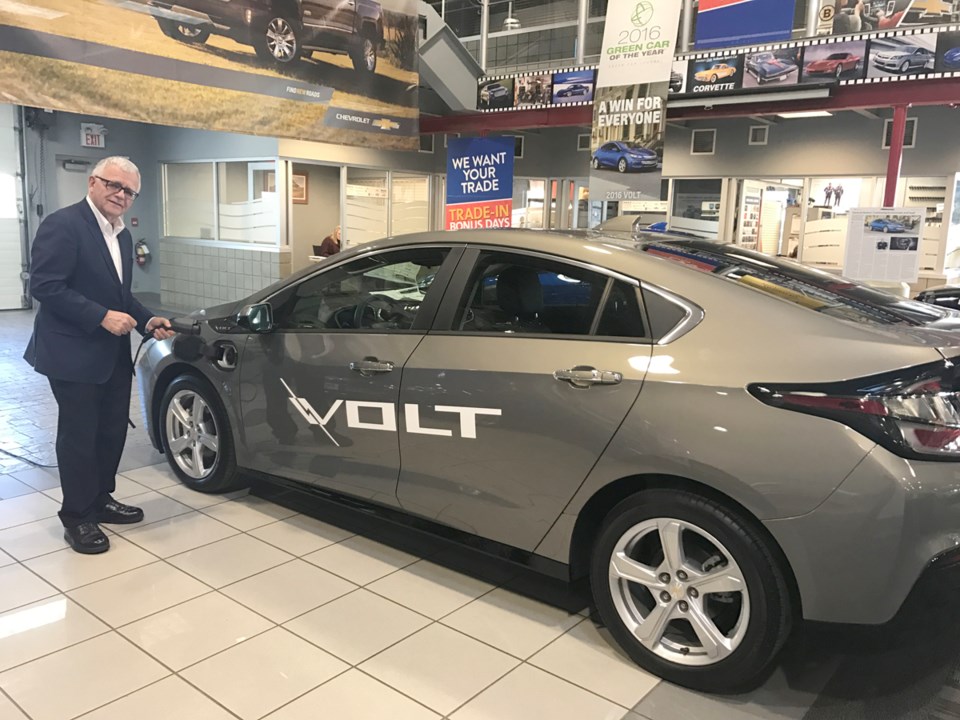Thinking about trading in your fossil fuel-burning, carbon emission-belching car and going clean and “green” with a brand new, electric-powered ride?
Well, a Richmond-based not-for-profit society has just given motorists a good number of new reasons to make the switch — about 6,000 of them, if you count a dollar bill for each one.
Earlier this week, BC Scrap-It announced it was launching a new incentive to help lower the cost of buying a new electric car by $6,000 when car owners trade in their old, combustion engine-driven auto which will then be reduced to scrap metal.
Dennis Rogozo, BC Scrap-It’s CEO, told the News that his organization’s single purpose is to junk old cars and get drivers into a cleaner mode of transportation, which he believes in the future will belong to electric vehicles (EVs).
“With more manufacturers offering a wider range of models, prices and a number of incentives to buy, like ours, I think we’re at a tipping point right now in favour of the electric car,” he said.
There is no restriction on the age of the vehicle scrapped through BC Scrap-It. But it must have been on the road and fully licensed and insured for six months prior to the transaction and capable of being driven to the scrap yard.
“What that means, then, is we’re taking a vehicle off the road that’s fully operable and spewing smog and carbon emissions into the environment,” Rogozo said.
The list of electric cars that qualify for the incentive program includes those almost entirely powered by electricity and do not exceed $77,000.
“It’s an equity issue, right?” Rogozo said. “If you can afford to spend more than that on a vehicle, I’m not sure you need an incentive.”
BC Scrap-It finances its incentives — there are only 500 of its $6,000 discounts available for 2017 — through the value of the scrap metal recovered and private funding. No government money is currently involved.
Judging by the numbers, the discounts available in B.C. can add up and make car buyers think twice about going electric.
With the BC Scrap-It incentive of $6,000, combined with the provincial government’s electric car ownership incentive (Clean Energy Vehicle Program) of up to $5,000, buyers can get a pretty hefty, $11,000 discount on their new EV.
Plus, some manufacturers, such as Nissan, are offering their own buyer’s incentive, Rogozo said. All told, that could add up to a discount of $15,000 on a new Nissan Leaf, which has a base price of around $34,000.
“We tend to attract people who have okay functioning vehicles, but are getting into a higher risk situation for repairs that could be more costly than what their car is worth,” Rogozo said. “And they are saying, ‘What do we do with this thing?’
And getting a brand new car for about $20,000 that doesn’t need to be refueled at the gas pump might be the choice for some.
Even the concern of “range anxiety” – the distance an EV can travel on a single charge – has been reduced by advances in technology, Rogozo said, adding the newly released Chevrolet Bolt can go 325 km before being recharged.
Also fueling the shift is a steadily increasing number of public charging stations for EVs. Presently, Richmond requires new apartment complexes to have 45 per cent of all parking spaces with charging potential. The city provides four, public charging stations that are free to use. Plus, there are another 27 private charging stations, some of which charge fees.
“But with the longer ranges now, you don’t have to charge your car every day, depending on the use,” Rogozo said. “You can charge it overnight, or once a week, at home. So, the need for public charging is not so great. But it’s still important because it provides a sense of confidence to owners out there. And we’ll see more of that.”
Operating since 1996 with a range of incentives — from discounts in bicycles to transit passes — B.C. Scrap-It states it has removed 40,000 polluting vehicles from across the province, recycled 164,332 tires, 57,927 tonnes of steel and reduced carbon emissions by close one million tonnes.
While the recycling numbers are impressive, Rogozo said the most important one to the program is the impact on carbon emissions.
“We’re a little different because the parts from the cars we scrap are not recycled and kept in the system to keep older cars on the road,” Rogozo said.
“Our view is that this is a better environmental outcome because the old cars become raw material and, I joke in public, that they come back as toasters.”



